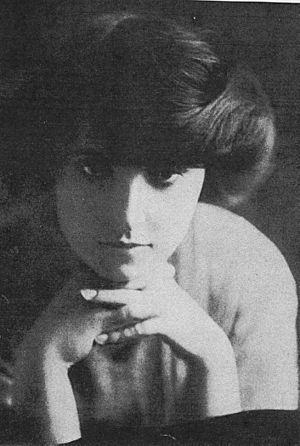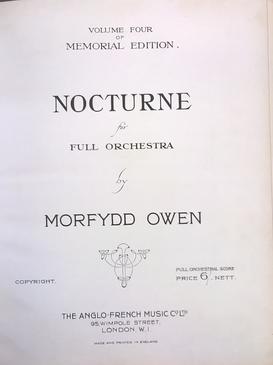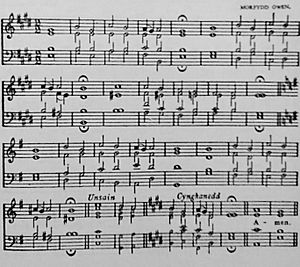Morfydd Llwyn Owen facts for kids
Quick facts for kids
Morfydd Owen
|
|
|---|---|
 |
|
| Born | 1 October 1891 Treforest, Wales
|
| Died | 7 September 1918 (aged 26) Swansea, Wales
|
| Occupation | Musician, composer |
| Spouse(s) | Ernest Jones |
Morfydd Llwyn Owen (born October 1, 1891 – died September 7, 1918) was a talented Welsh composer, pianist, and singer. She was known for her many musical pieces and was part of important groups of thinkers and artists. Sadly, she passed away just before her 27th birthday.
Contents
Early Life and Education
Morfydd Owen was born in Treforest, Wales, on October 1, 1891. Her parents, William and Sara Jane Owen, loved music and owned a fabric shop. Morfydd showed a great gift for music from a very young age. She started piano lessons early and even performed as a soloist in a famous piano concert by Grieg when she was a teenager.
At 16, she began studying piano and composition with Dr. David Evans in Cardiff. Her first published work, a hymn tune called "Morfydd," came out in 1909. After two years with Dr. Evans, Morfydd won a scholarship to study at the University College in Cardiff. Many of her pieces were played at student concerts there, and she graduated in 1912.
In the same year, she was welcomed into the Gorsedd of the Bards at the Wrexham National Eisteddfod. This is a special Welsh cultural event. She was given the name Morfydd Llwyn Owen, adding "Llwyn" to honor her father's childhood home.
Morfydd's parents were not sure about her continuing her studies in London. But a politician named Eliot Crawshay-Williams helped convince them. Morfydd and her father had set one of his poems to music. Morfydd earned her music degree in July 1912. She was then accepted into the Royal Academy of Music in London with a special scholarship.
She started at the Royal Academy in September 1912. Her main focus was composing, but she also studied piano and singing. Her teacher was Frederick Corder, who taught many famous British composers. Morfydd was a very successful student. In her first year, she won two awards: one for her composition, Nocturne in D♭ major, and another for her overall excellence. She continued to win awards and have her works performed during her time at the Academy.
Life and Career in London
While living in London, Morfydd made two main groups of friends. One group was centered around the Welsh Presbyterian Chapel in Charing Cross. This church was a popular meeting place for many Welsh people in London. Morfydd became very close friends with Lady Ruth Lewis, whose husband was a Member of Parliament. Lady Lewis was important in the Welsh Folk-Song Society of London. Morfydd joined in, writing down and adding music to many Welsh folk songs. She also helped Lady Lewis with her talks about folk music. In 1914, they published a collection of folk songs together. Morfydd also knew David Lloyd George, who was a powerful government official. He asked her to compose a piece and chose her to sing at a big Welsh singing festival in 1916.
Morfydd's other group of friends was in Hampstead, where she shared a flat with her friend Elizabeth Lloyd. Hampstead was a lively place for writers in London. Morfydd met famous writers like D. H. Lawrence and Ezra Pound. She also became friends with several Russian people living in London, including Prince Felix Yusupov. Through her Russian friends and her work with Welsh folk songs, Morfydd became very interested in Russian folk music. In 1915, she received a special grant to visit Saint Petersburg to study folk music from Russia, Norway, and Finland. However, the First World War made it impossible for her to travel overseas.
Morfydd developed her voice as a mezzo-soprano, which is a type of female singing voice. In 1913, she sang four of her own songs at a concert in London's Bechstein Hall. These songs included Chanson de Fortunio and Suo Gân. In the same year, her Nocturne in D♭ major was performed at the Queen's Hall. She also won first prize for singing at a music festival in Swansea. Her first professional singing performance was in January 1917 at the Aeolian Hall in London. Later that year, her song For Jeanne's Sake was performed at the famous Henry Wood Promenade Concerts.
Morfydd Owen became a sub-professor at the Royal Academy of Music. In 1918, she received the Academy's Associate diploma, called the ARAM, which was a great honor.
Marriage and Death
In late 1916, Morfydd met Ernest Jones, a doctor who studied the human mind. After a short time, they got married in London on February 6, 1917. This was a surprise to many of her friends, as few knew the wedding was happening. Her parents could not attend because Ernest changed the wedding date at the last minute. Ernest Jones was a very well-known figure in Britain. He believed in Freud's ideas about the mind.
There were some differences in their marriage, especially about how much time Morfydd could spend on her music. Ernest wanted her to focus more on supporting his busy life. To help with some of the tensions, they had another wedding ceremony at the Charing Cross Welsh Presbyterian Chapel in September, with Morfydd's family and friends present.
In the summer of 1918, Morfydd and Ernest were on holiday in South Wales. They were staying at Ernest's father's home near Swansea. Morfydd became very ill with appendicitis, which is a painful swelling of the appendix. Ernest hoped his brother-in-law, a famous surgeon, could come to operate. But the surgeon advised that Morfydd needed surgery right away. The operation was done at the family home by a leading surgeon from South Wales. Sadly, Morfydd passed away on September 7, most likely due to problems from the anesthetic used during the surgery.
Morfydd Owen was buried on September 11 in Oystermouth Cemetery near Swansea. Her gravestone has a special message chosen by Ernest from a famous book called Faust: "Das Unbeschreibliche, hier ist's getan" (The indescribable, here it is done).
In 1924, Ernest Jones worked with Frederick Corder to publish a special four-volume collection of Morfydd's music. This collection included her orchestral, instrumental, and vocal pieces. Her close friend Elizabeth Lloyd wrote that "Each page brought fresh memories of our lost darling" when she received her copy. Later, in 1991, new editions of some of her songs and piano pieces were published to celebrate 100 years since her birth.
Works
Even though Morfydd Owen only composed seriously for about 10 years, she created around 250 pieces of music. These include works for small groups of instruments, piano, choirs, and large orchestral pieces. However, her most important and well-known works are her songs for voice and piano. Some of her famous songs include Slumber Song of the Madonna, To our Lady of Sorrows, Suo Gân, and her masterpiece in Welsh, Gweddi y Pechadur. She also wrote about 22 hymn tunes and several anthems (songs for choirs).
In 2018, 100 years after her death, the BBC Proms music festival featured her Nocturne in D♭ major for full orchestra from 1913. It was performed by the BBC National Orchestra of Wales.
Selected Compositions
Here are some of Morfydd Owen's works from the 1924 collection made to honor her. The names in brackets are the authors of the lyrics or poems she set to music.
Orchestral Works
- 1910 Romance for strings
- 1911 A Cycle of Sea Songs for mezzo-soprano and orchestra
- 1911 Sea Drift (Walt Whitman), a scene for mezzo-soprano and orchestra
- 1911 Country Dance for small orchestra
- 1912 Ave Maria for mezzo-soprano, chorus, and strings
- 1912 Love's Music, for soprano and orchestra (score is missing, but parts still exist)
- 1912 My Sorrow, for soprano and orchestra (E. Crayshaw Williams)
- 1913 Chorus for soprano, choir, and orchestra
- 1913 Nocturne in D♭ major for orchestra
- 1913 Prelude in F major for orchestra (not finished)
- 1913 Toward the Unknown Region, a scene for mezzo-soprano and orchestra
- 1914 Morfa Rhuddlan, a tone-poem for orchestra
- 1915 Pro Patria, a cantata for soprano and baritone, chorus, and orchestra (William Hughes Jones)
- 1916 Threnody for the Passing of Branwen, for string orchestra
- 1916 Funeral March to Branwen, for orchestra
Choral Works
Chamber Music
- 1910 Romance for violin and piano
- 1915 The Cathedral at Liège and The Cathedral at Rheims, piano trio, written under the pen name 'Lenavanmo'
Piano Music
- 1908 Minuet and Trio
- 1910 Sonata in E minor
- 1912 Maida Vale tone poem
- 1914 Four Welsh Impressions
- 1914 Rhapsody in C♯ minor
- 1914 Prelude in E minor
- ? Glantaf tone poem
Hymn Tunes
- 1908 Treforest (Thomas Jones)
- 1909 Morfydd
- 1913 Gweddi y Pechadur (Thomas William)
- 1915 Llwyn Owen (Williams Pantycelyn)
- 1915 Richard (Williams Pantycelyn)
- 1915 Sarah (Williams Pantycelyn)
- 1915 Calvary (William Owen)
- 1915 William (John Caergyli/Rhoslan K. Jones)
Songs
- 1910 Be Thou Exallted
- 1911 A Song of Sorrow (William Blake)
- 1911 An Indian Night (Eliot Crawshay-Williams)
- 1911 Blow, blow thou winter wind (Shakespeare)
- 1911 Daisy's Song (Keats)
- 1911 Lullaby at Sunset (Eliot Crawshay-Williams)
- 1911 Mirage (Eliot Crawshay-Williams)
- 1911 Orbits (Richard le Gallienne)
- 1911 Sweet love, now I must leave thee
- 1911 The Nightingale
- 1912 Clancy's Song (G. B. Connolly)
- 1912 Infant Joy (William Blake)
- 1912 My Love's Like a Red, Red Rose, part-song
- 1912 Pippa's Song - A Year at the Spring (Robert Browning)
- 1912 The Willow Song (Mrs Hemans)
- 1912 To Our Lady of Sorrows (Wilfred Hinton)
- 1913 Oh when my righteous judge? (Lady Huntingdon)
- 1913 A Serenade
- 1913 Beatific Sea (Campbell)
- 1913 By the lone sea shore (Charles Mackay)
- 1913 Chanson de Fortunio (Alfred de Musset)
- 1913 Foredoomed (P. Bourke Marston)
- 1913 Haurahan reproves the curlew (W. B. Yeats)
- 1913 Hedh laments the loss of his love (W. B. Yeats)
- 1913 If I had but two little wings (Coleridge)
- 1913 Mountain Song (Carlton Hill)
- 1913 Slumber-Song of the Madonna (Alfred Noyes)
- 1913 Song from a Persian Village (E. Crayshaw Williams)
- 1913 Spring (William Blake)
- 1913 Suo Gân (Robert Bryan)
- 1913 The Fairies' Wedding (Eos Gwalia)
- 1913 The Sea hath its Pearls (Heine/Longfellow)
- 1914 A Mother's Lullaby (Morfydd Owen)
- 1914 April (William Hinton)
- 1914 Fun o' the Fair (Ethel Newman)
- 1914 God Made a Lovely Garden (Mabel Spence)
- 1914 La Tristesse (Alfred de Musset)
- 1914 The Lamb (William Blake)
- 1914 To Violets (Robert Herrick)
- 1914 Two Songs of a Slave (Ethel Newman)
- 1915 All in the April Evening (Katherine Tynan)
- 1915 Emyn Moliant (R. R. Morris)
- 1915 Trugarha wathyft, O Dhuw: A Vesper
- 1915 What does little birdie say? (Tennyson)
- 1916 A Little Song (Wilfid Roland Childe)
- 1916 Away in a Manger
- 1916 Good Friday (Katherine Tynan)
- 1916 He prayeth best who loveth best (Coleridge)
- 1916 I Saw Three Ships (Katherine Tynan)
- 1916 In Cradle Land (Eos Gwalia)
- 1916 Jesus, Tender Saviour
- 1916 Mister Rain (Richard Aldington)
- 1916 Nature's Bride (Eos Gwalia)
- 1916 O See the Sky! (D. Middleman)
- 1916 Pen Ucha, (Williams Pantycelyn)
- 1916 Resurrection (Katherine Tynan)
- 1916 Shepherd's Love Song
- 1916 The Maid at the Wheel (Ethel Newman)
- 1916 The Almond Tree of Mulvaney (Wilfid Roland Childe)
- 1916 The Dream of Mary (Katherine Tynan)
- 1916 The Ploughman's Lass (Ethel Newman)
- 1916 The Silent Sounds to the Soldier's Tread (A. E. Housman)
- 1916 The Weeping Babe (Katherine Tynan)
- 1916 William (Eric Hiller)
- 1916 The Land of Hush-a-bye (Eos Gwalia)
- 1917 A Noontide Lullaby (Ethel Newman)
- 1917 An Irish Lullaby
- 1917 Look at me, Sam (Thomas Edward Brown)
- 1917 Patrick's Your Boy (Ethel Newman)
- 1917 Pitter Patter (Douglas Ainslie)
- 1917 When I came Last to Ludlow (A. E. Housman)
- 1918 Fussy Hills (Eos Gwalia)
- 1918 Impenitent (Ethel Newman)
- 1918 Mary (P. J. O'Reilly)
- 1918 Speedwell (A. Eversley)
- 1918 Sunshine Town (P. J. O'Reilly)
- ? Sweet Mother, Comfort me
 | Ernest Everett Just |
 | Mary Jackson |
 | Emmett Chappelle |
 | Marie Maynard Daly |



